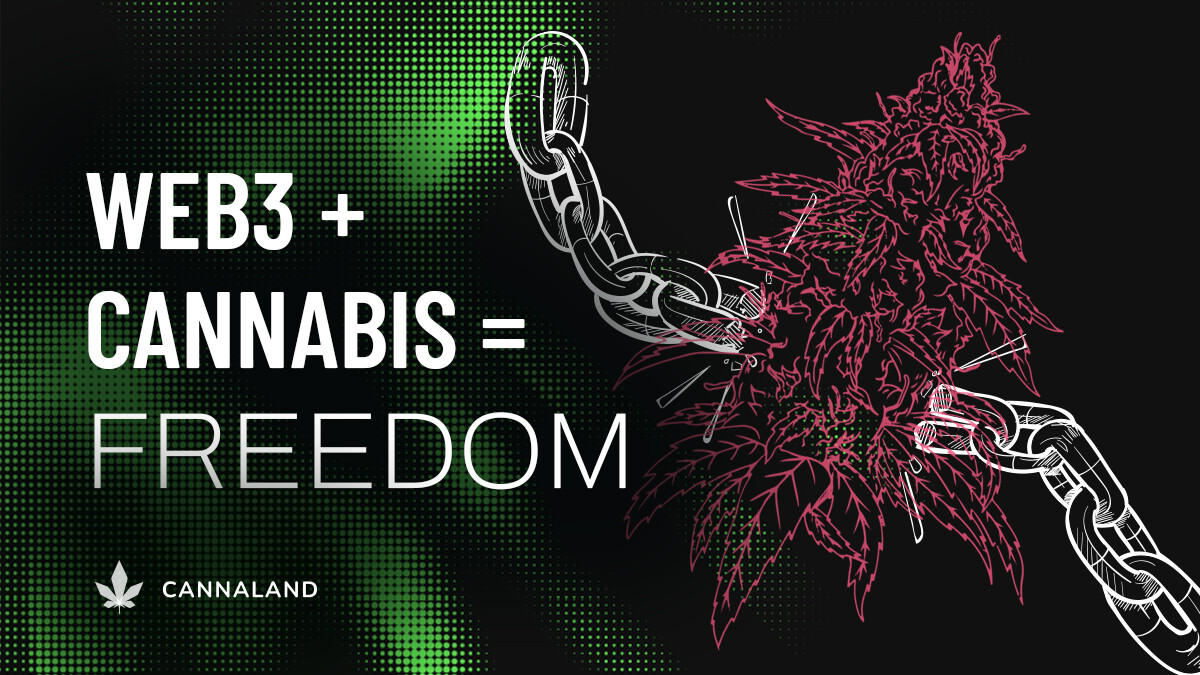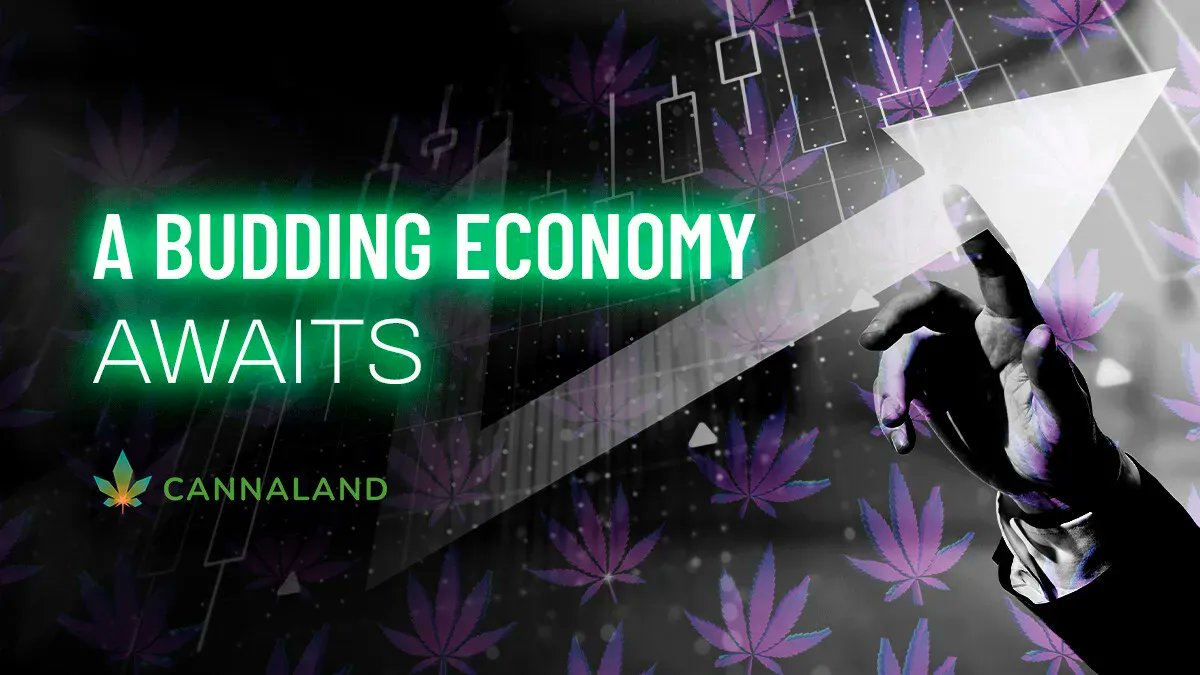It’s high time the fragmented cannabis industry had a centralized, virtual hub for connoisseurs and leading-edge companies to connect. Thankfully for the 147 million cannabis users and the entrepreneurs who fulfill their every need, CANNALAND is poised to offer exactly that.
Taking both the tech and herbal worlds by storm, the cannabis-themed metaverse is the first of its kind: a brand-centered ecosystem with unparalleled user experience that encourages conversational marketing and genuine relationship building.
Providing a 360-degree immersive experience for cannabis fans and the canna curious, CANNALAND is leveraging technology that, until recently, was the stuff of dreams. VR, blockchain, AI, web 3.0…Are these buzzwords really transforming our relationship to technology in our daily lives? The short answer is yes.
Scroll on for the long answer — an exploration of CANNALAND’s mechanical workings, fresh from the vanguard of technological advancements that are shifting the digital landscape.
Prefer to listen? Learn about CANNALAND’s industry-leading tech directly from the company’s co-founder in this live-recorded chat with Matthew Morgan.
CANNALAND Fundamentals
The brilliance of CANNALAND’s functionality lies in its ability to centralize every facet of the cannabis purchasing experience. Businesses maintain total control over their product while joining the metaverse, and consumers get access to a world of shopping, socializing, and gaming from home.
Currently hosted on web 2.0, the revolutionary ecosystem utilizes the latest technology to create an immersive experience while setting up to transition to web 3 following its full launch. In addition to the bridging of web 2.0 and 3.0, the core tech shaping the cannabis metaverse ranges from VR/AR and artificial intelligence to blockchain-based decentralized finance.
What is the Metaverse? How is it related to Web 3.0?
The metaverse, like web 3, is primed to be the next phase in our technological evolution.
In its simplest of forms, the metaverse is an interconnected web of simulated communities that create a limitless world. Replacing flat, two-dimensional screens with a shared 3D space that exists persistently, the metaverse allows users to interact via digital facsimiles of themselves.
The term was first coined in 1992 by author Neal Stephenson — his book Snow Crash follows the protagonist’s journey to defeat a virtual villain in a technologically-advanced American future. Films like Ready Player One have continued to perpetuate the action-packed, apocalyptic perception of the metaverse, but the reality isn’t quite so sci-fi.
In practice, the metaverse will utilize tech the general public has already experimented with and accepted, like VR, AR, and MR.
According to a recent survey by CoinWire, 69% of respondents believed the #metaverse would transform social lifestyle through a novel approach to entertainment.
Read more about Microsoft securing 158 metaverse-related patents 👉 https://t.co/g5IslUI6VQ pic.twitter.com/sFM1xRpfZj
— Cannaland (@TheCannaland) January 24, 2023
VR: virtual reality is an all-encompassing, 360-degree simulated environment that uses computer technology and near-eye displays, like headsets, to allow users to explore every nook and cranny.
AR: augmented reality also utilizes computer technology for an immersive experience, but combines real-world environments with virtual elements in the form of visual, auditory, or haptic content — think Pokemon GO.
MR: mixed reality combines our physical and virtual worlds in a similar way, with the exception that MR uses leading-edge tracking and imaging technology that lets users interact with objects in both the corporeal and digital spheres.
Thankfully, Fortnite’s recent virtual concert has given the public a better understanding of what VR will look like in the metaverse, and how users will dive into cyberspace. Having gathered 12 million people in one digital locale, the Fortnite concert reflects the massive opportunity awaiting businesses and individuals in the metaverse: a boundaryless space to experience and explore.
Web 3.0 vs Web 2.0

If the metaverse is a virtual field expanding infinitely in every direction, then web 3.0 is the access road individuals can take to reach it.
Web 3’s full launch will pave the way for the new relationship to technology the metaverse is building. The latter changes how users will interact with the digital world, while the former is primarily concerned with who will rule the new internet all together.
Web 3.0 differs from web 2.0 in three core ways:
1 – It’s decentralized.
Decentralization transfers power and decision-making capabilities from a few major companies to the entire network of users. Rather than having users request access to internet services from the authorities — Google, Apple, etc. — web 3’s decentralized operating system disseminates power throughout the masses.
2 – It’s permissionless.
Web 3 is decentralized, so users will be able to access the third version of the internet without the need for any intermediaries. In practice, that looks like a seamless logging on experience, sans the stereotypical password and username variations for every individual site.
As long as you have an internet connection, you can join the space, make transactions, and store your information anonymously.
3 – It’s decidedly more secure.
In a centralized network with only one point of entry, the barriers between hackers and your sensitive information are thin at best. With power dispersed throughout a wide-reaching network, however, the possibility of hackers gaining access to personal and private data becomes basically zilch.
Web 3.0 is based on blockchain technology, so even if one or more nodes are taken over or hacked, the remainder of the vast, interwoven network remains unscathed.
What is blockchain technology?
Blockchain: a system for recording information that involves a repeatedly duplicated ledger that is distributed throughout a network of computers.
Blockchain technology has given way to DeFi, or decentralized finance. No longer are consumers tethered to one central banking corporation for their financial interactions — DeFi returns authority to the individual and eliminates banking fees.
Though the user experience of CANNALAND extends far beyond shopping, the combination of blockchain technology, decentralized cryptocurrency, and web 3.0 positions the metaverse as the safest option for purchasing cannabis products.

CANNALAND’s AI
When cannabis aficionados do go to purchase their latest asset or product, expert sommeliers are ready in the CANNALAND universe to answer any question they could possibly have — courtesy of AI.
AI: short for artificial intelligence, or machine simulation of thoughts, perceptions, and feelings that mimic that of humans.
By leveraging the latest in AI developments, CANNALAND provides users with a more humanized experience of searching for an answer on the web. Avatars can autonomously answer inquiries about products before purchasing so consumers feel confident in their secure, informed transaction.
As fascinating as it may be to read about the cutting-edge technology that makes for an unrivaled virtual experience, actually experiencing it is a whole other ball game. Stay up to date on the latest CANNALAND news, releases, and opportunities by following along on social, and jumpstarting your metaverse journey with CNLT.


